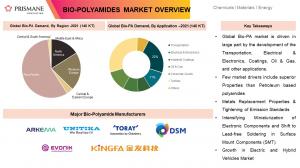
[ad_1]
PUNE, MAHARASHTRA, INDIA, June 6, 2023/EINPresswire.com/ — Prismane Consulting is pleased to publish its Global Biopolyamides Market Study Report. This report forms a part of the Bioplastics Strategy report published by Prismane Consulting. All existing capacities, country-wise capacity utilization rates, production, net trade, pricing analysis, business opportunity assessment, end-user repository, etc. has been included as a part of the study.
Request Sample Report:
https://prismaneconsulting.com/report_request_sample?_token=uzDaU7Y8eVuMpIwAO4UD61Qawadn7KD8UXim0GTc&report_id=356
Bio-polyamides are a type of bioplastics derived from renewable resources such as natural fats and oils. They possess exceptional mechanical properties, including high tensile strength, flexibility, toughness, resilience, and abrasion resistance. Polyamide 11 is produced from undecylenic acid, while other bio-polyamides are derived from sebacic acid. Polyamide 610 and polyamide 1010 are synthesized through step-growth polymerization using sebacic acid and diamines like hexamethylene-diamine (C6) and decamethylene-diamine (C10). PA11 is produced by brominating undecylenic acid and reacting it with ammonia to obtain 11-aminoundecanoic acid, which is then polymerized.
Bio-polyamides, such as PA11 and PA12, offer advantages over traditional polyamides like PA 6 and PA 66. These advantages include lower moisture absorption, higher impact strength, improved chemical resistance, higher melting point, greater elongation at break, and lower modulus. These bio-polyamides are particularly well-suited for lightweight applications in premium cars and commercial aircraft, as they can replace metal and rubber parts, resulting in weight reduction. Their superior properties, including higher impact strength, tensile strength, and impact notched toughness, outperform metal counterparts. Key application areas for biopolyamides include fuel lines, pneumatic air brake tubing, electrical cable jacketing, flexible oil & gas pipes, powder coatings, sporting goods, and electronic casings.
To know more about biopolyamides visit https://prismaneconsulting.com/report-details/global-bio-polyamide-bio-pa-market-study-2016-2032
Global biopolyamides production capacity in 2021 was approximately 200 kilo tons, with utilization rates for bio-polyamides other than polyamide 56 exceeding 85%. The addition of polyamide 56 capacity in China led to a decrease in overall biopolyamides capacity utilization rates. However, it is projected that global capacity will reach around 300 kilo tons by 2032, with significant capacity additions expected in Asia. Asia is expected to add around 30 kilo tons of bio-polyamide capacity between 2020 and 2025, with a projected increase to 65 kilo tons by 2030, mainly in China and the ASEAN region. China’s focus on sustainability is expected to boost the bio-polyamide market and the overall bioplastics/biodegradable polymers market.
Leading companies producing bio-based polyamides include Arkema, Envalior (formerly DSM), and Evonik. Kasai Bio from China ventured into the biopolyamides space with a production capacity of 100 kilo tons for Polyamide 56 which is comparable to polyamide 66. The development of polyamide 56 was driven by the demand-supply gap for polyamide 66, particularly in textile applications.
Download the free sample brochure here:
https://prismaneconsulting.com/report_request_sample?_token=uzDaU7Y8eVuMpIwAO4UD61Qawadn7KD8UXim0GTc&report_id=356
The growth opportunities for bio-polyamides in the automotive industry are driven by the push for lower emissions and increased fuel efficiency. By replacing metals with bio-polyamides, weight reduction can be achieved, contributing to fuel efficiency. They also align with the objectives of the Paris Climate Agreement by reducing greenhouse gas emissions. Their ease of moulding saves manufacturing time and energy while providing reliable toughness and outstanding impact performance. Bio-polyamides find applications in the automotive and aerospace industries due to their excellent resistance to fuel, antifreeze, transmission and brake fluids, stress, vibration, heat.
For more information on biopolyamides, polyamides, and bioplastics visit www.prismaneconsulting.com or write to us at info@prismaneconsulting.com
Related Studies:
Global Bioplastics Market Study, 2016-2032
Global Polyamides Market Study, 2016-2032
Global Specialty Polyamides Market Study 2016 – 2032
Tejas Shah
Prismane Consulting Private Limited
+ +91 20 6727 7711
tejas.shah@prismaneconsulting.com
Visit us on social media:
LinkedIn
Twitter
Facebook
YouTube
[ad_2]
Source link
The content is by EIN Presswire. Headlines of Today Media is not responsible for the content provided or any links related to this content. Headlines of Today Media is not responsible for the correctness, topicality or the quality of the content.

